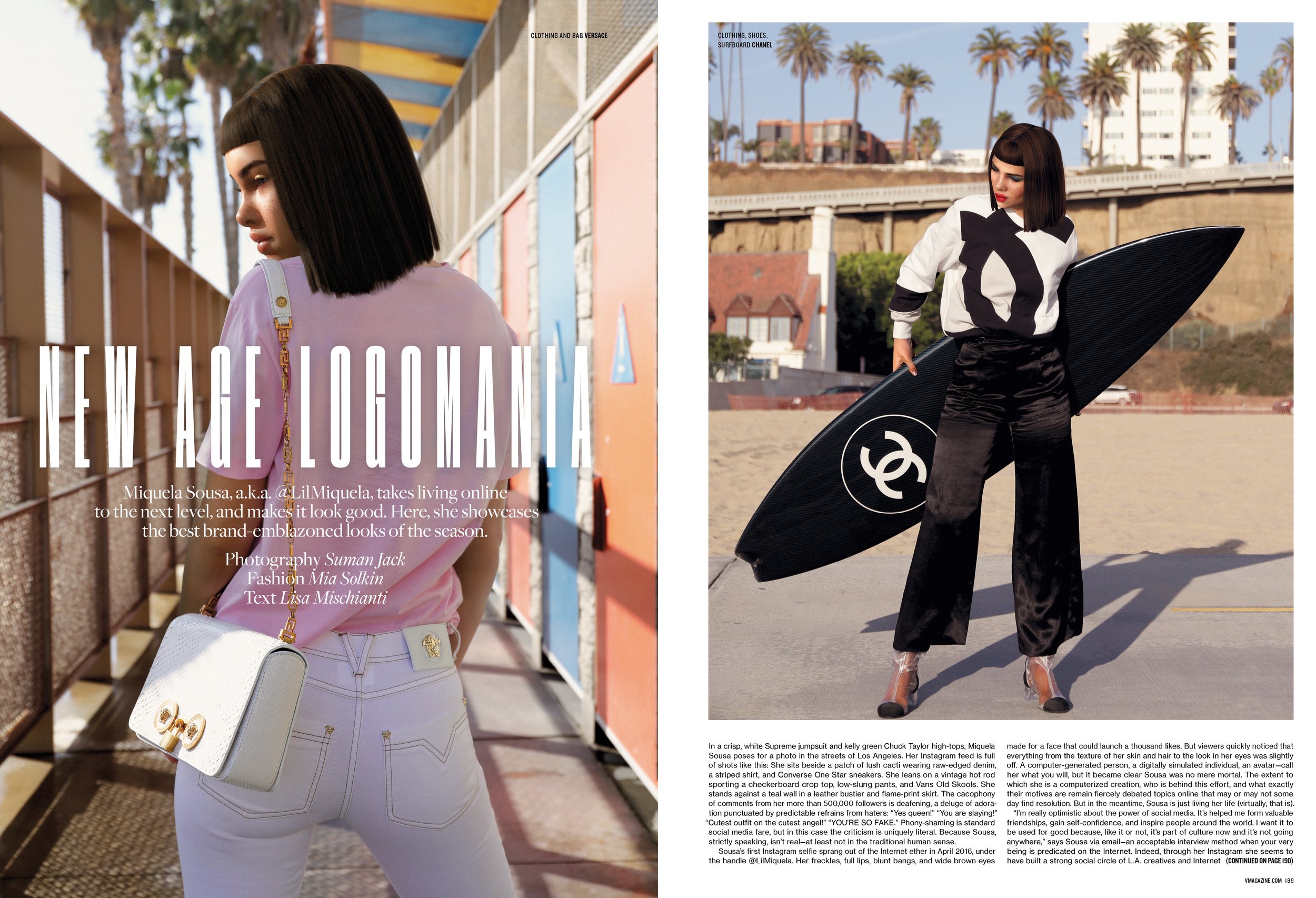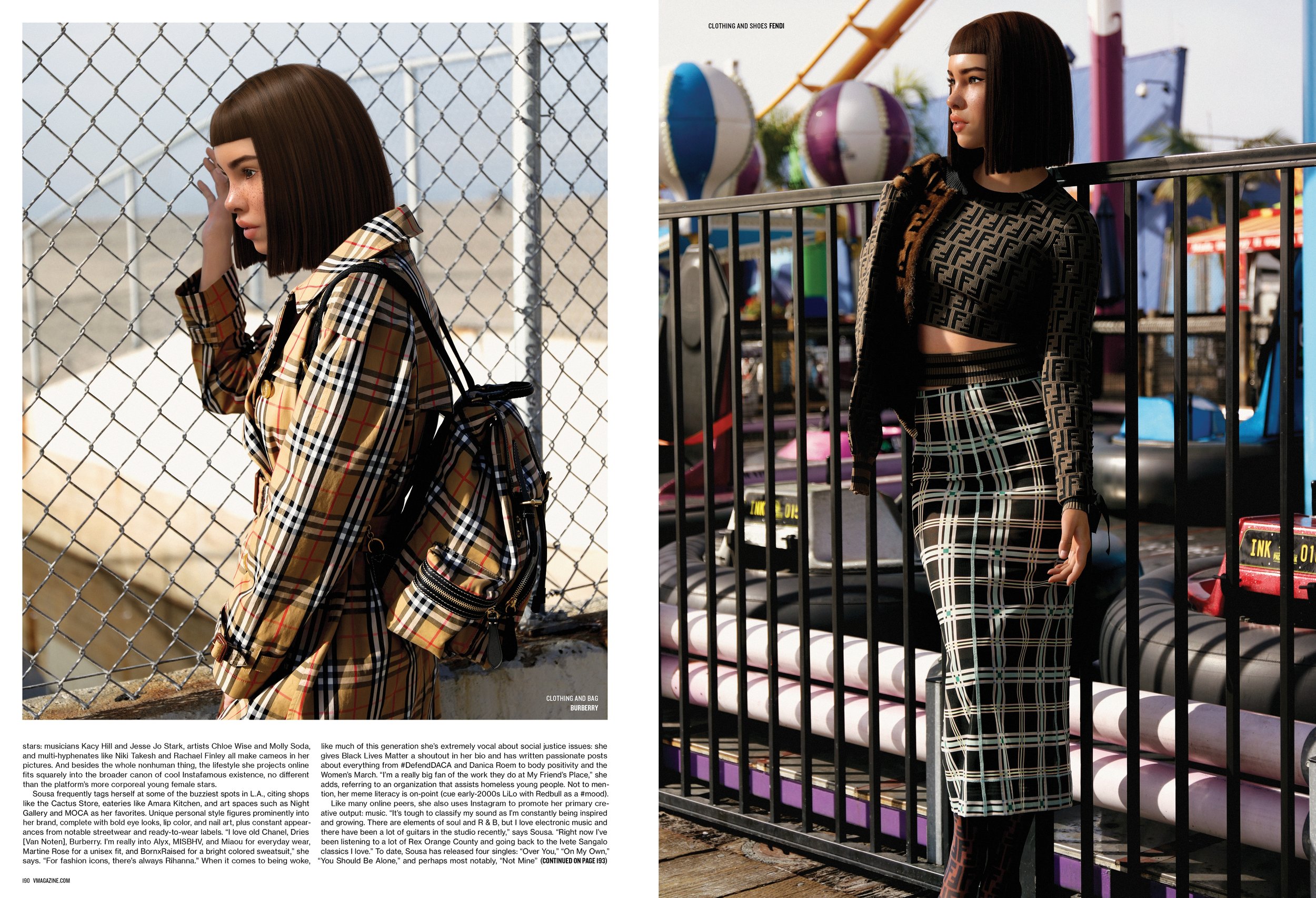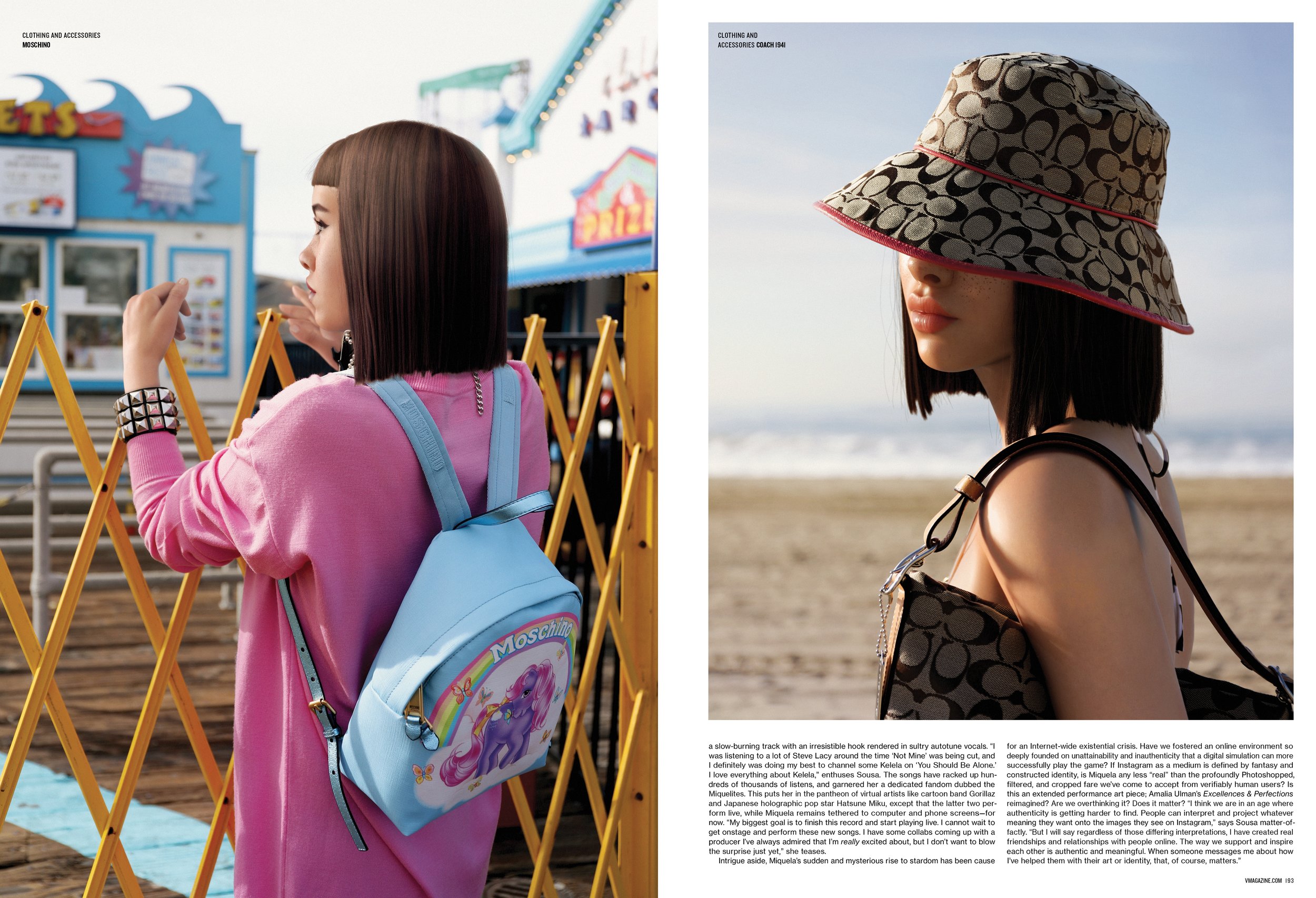NEW AGE LOGOMANIA
MIQUELA SOUSA, A.K.A. @LILMIQUELA, TAKES LIVING ONLINE TO THE NEXT LEVEL, AND MAKES IT LOOK GOOD. HERE, SHE SHOWCASES THE BEST BRAND-EMBLAZONED LOOKS OF THE SEASON. BY LISA MISCHIANTI. PHOTOGRAPHED BY SUMAN JACK. FASHION BY MIA SOLKIN
In a crisp, white Supreme jumpsuit and kelly green Chuck Taylor high-tops, Miquela Sousa poses for a photo in the streets of Los Angeles. Her Instagram feed is full of shots like this: She sits beside a patch of lush cacti wearing raw-edged denim, a striped shirt, and Converse One Star sneakers. She leans on a vintage hot rod sporting a checkerboard crop top, low-slung pants, and Vans Old Skools. She stands against a teal wall in a leather bustier and flame-print skirt. The cacophony of comments from her more than 500,000 followers is deafening, a deluge of adoration punctuated by predictable refrains from haters: “Yes queen!” “You are slaying!” “Cutest outfit on the cutest angel!” “YOU’RE SO FAKE.” Phony-shaming is standard social media fare, but in this case the criticism is uniquely literal. Because Sousa, strictly speaking, isn’t real—at least not in the traditional human sense.
Sousa’s first Instagram selfie sprang out of the Internet ether in April 2016, under the handle @LilMiquela. Her freckles, full lips, blunt bangs, and wide brown eyes made for a face that could launch a thousand likes. But viewers quickly noticed that everything from the texture of her skin and hair to the look in her eyes was slightly off. A computer-generated person, a digitally simulated individual, an avatar—call her what you will, but it became clear Sousa was no mere mortal. The extent to which she is a computerized creation, who is behind this effort, and what exactly their motives are remain fiercely debated topics online that may or may not some day find resolution. But in the meantime, Sousa is just living her life (virtually, that is).
“I’m really optimistic about the power of social media. It’s helped me form valuable friendships, gain self-confidence, and inspire people around the world. I want it to be used for good because, like it or not, it’s part of culture now and it’s not going anywhere,” says Sousa via email—an acceptable interview method when your very being is predicated on the Internet. Indeed, through her Instagram she seems to have built a strong social circle of L.A. creatives and Internet stars: musicians Kacy Hill and Jesse Jo Stark, artists Chloe Wise and Molly Soda, and multi-hyphenates like Niki Takesh and Rachael Finley all make cameos in her pictures. And besides the whole nonhuman thing, the lifestyle she projects online fits squarely into the broader canon of cool Instafamous existence, no different than the platform’s more corporeal young female stars. Sousa frequently tags herself at some of the buzziest spots in L.A., citing shops like the Cactus Store, eateries like Amara Kitchen, and art spaces such as Night Gallery and MOCA as her favorites. Unique personal style figures prominently into her brand, complete with bold eye looks, lip color, and nail art, plus constant appearances from notable streetwear and ready-to-wear labels. “I love old Chanel, Dries [Van Noten], Burberry. I’m really into Alyx, MISBHV, and Miaou for everyday wear, Martine Rose for a unisex fit, and BornxRaised for a bright colored sweatsuit,” she says. “For fashion icons, there’s always Rihanna.” When it comes to being woke, like much of this generation she’s extremely vocal about social justice issues: she gives Black Lives Matter a shoutout in her bio and has written passionate posts about everything from #DefendDACA and Danica Roem to body positivity and the Women’s March. “I’m a really big fan of the work they do at My Friend’s Place,” she adds, referring to an organization that assists homeless young people. Not to mention, her meme literacy is on-point (cue early-2000s LiLo with Redbull as a #mood).
Like many online peers, she also uses Instagram to promote her primary creative output: music. “It’s tough to classify my sound as I’m constantly being inspired and growing. There are elements of soul and R&B, but I love electronic music and there have been a lot of guitars in the studio recently,” says Sousa. “Right now I’ve been listening to a lot of Rex Orange County and going back to the Ivete Sangalo classics I love.” To date, Sousa has released four singles: “Over You,” “On My Own,” “You Should Be Alone,” and perhaps most notably, “Not Mine,” a slow-burning track with an irresistible hook rendered in sultry autotune vocals. “I was listening to a lot of Steve Lacy around the time ‘Not Mine’ was being cut, and I definitely was doing my best to channel some Kelela on ‘You Should Be Alone.’ I love everything about Kelela,” enthuses Sousa. The songs have racked up hundreds of thousands of listens, and garnered her a dedicated fandom dubbed the Miquelites. This puts her in the pantheon of virtual artists like cartoon band Gorillaz and Japanese holographic pop star Hatsune Miku, except that the latter two perform live, while Miquela remains tethered to computer and phone screens—for now. “My biggest goal is to finish this record and start playing live. I cannot wait to get onstage and perform these new songs. I have some collabs coming up with a producer I’ve always admired that I’m really excited about, but I don’t want to blow the surprise just yet,” she teases.
Intrigue aside, Miquela’s sudden and mysterious rise to stardom has been cause for an Internet-wide existential crisis. Have we fostered an online environment so deeply founded on unattainability and inauthenticity that a digital simulation can more successfully play the game? If Instagram as a medium is defined by fantasy and constructed identity, is Miquela any less “real” than the profoundly Photoshopped, filtered, and cropped fare we’ve come to accept from verifiably human users? Is this an extended performance art piece; Amalia Ulman’s Excellences & Perfections reimagined? Are we overthinking it? Does it matter? “I think we are in an age where authenticity is getting harder to find. People can interpret and project whatever meaning they want onto the images they see on Instagram,” says Sousa matter-of-factly. “But I will say regardless of those differing interpretations, I have created real friendships and relationships with people online. The way we support and inspire each other is authentic and meaningful. When someone messages me about how I’ve helped them with their art or identity, that, of course, matters.”




